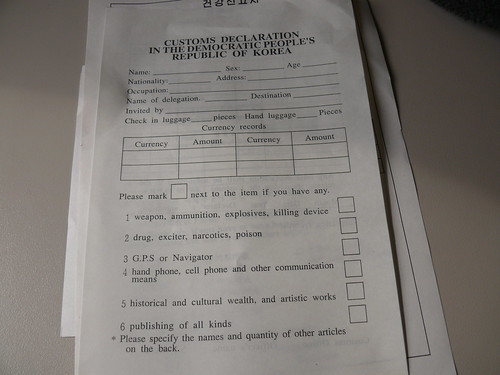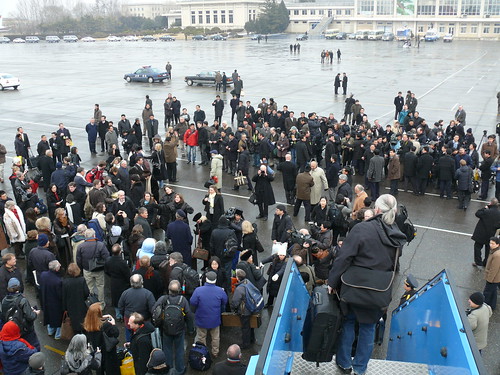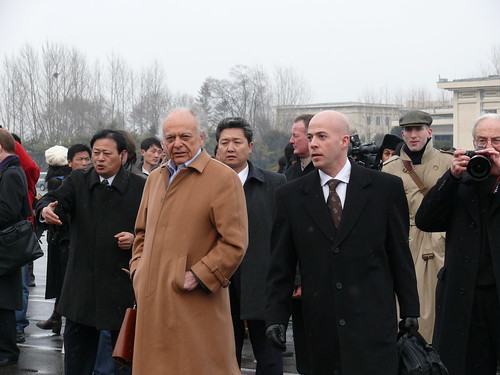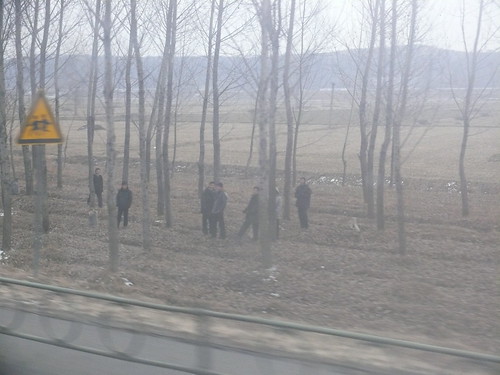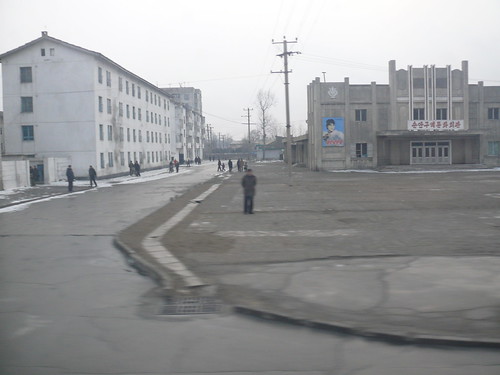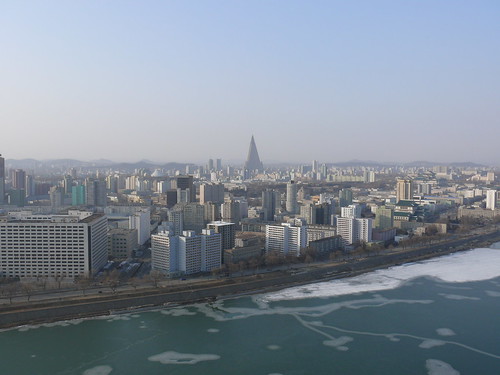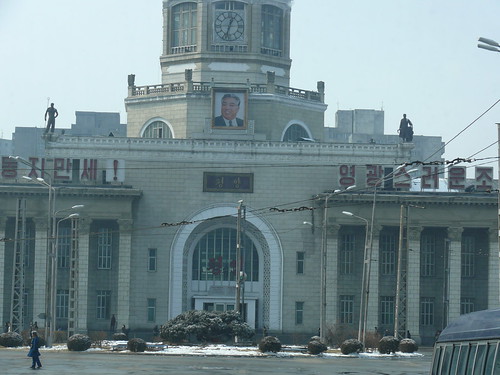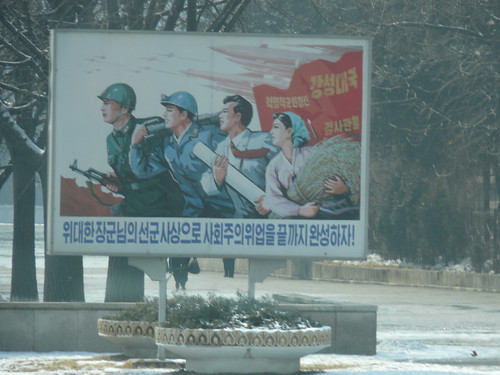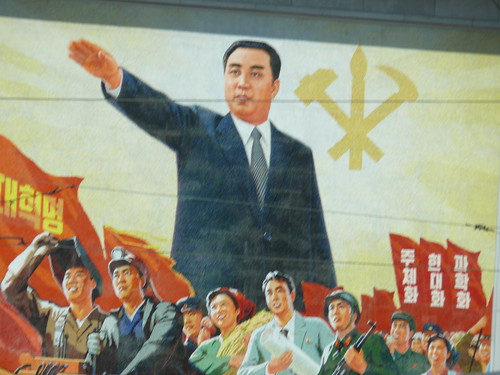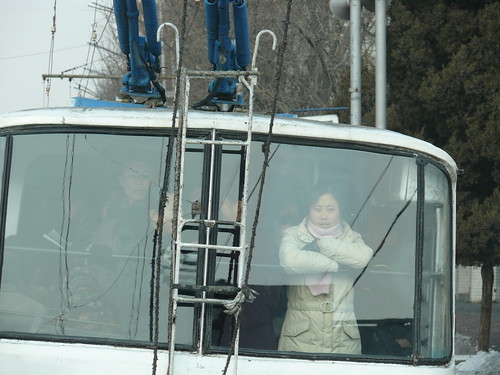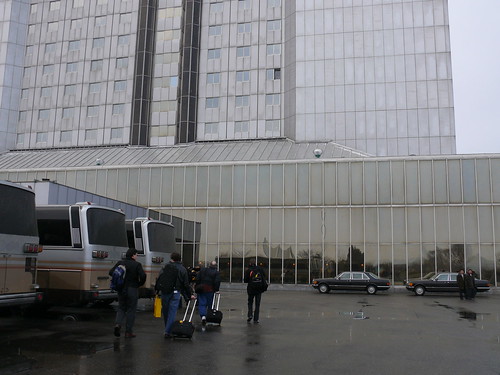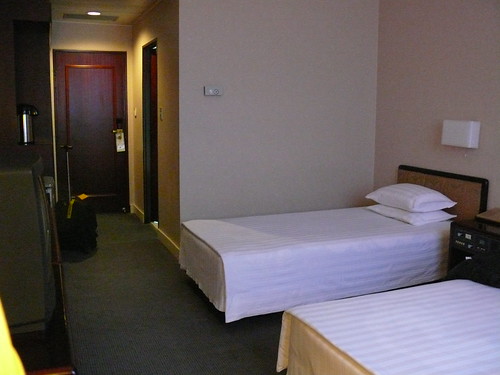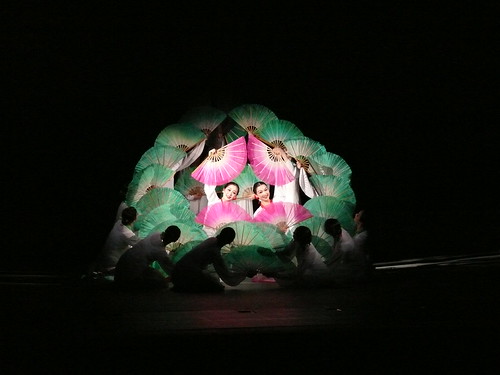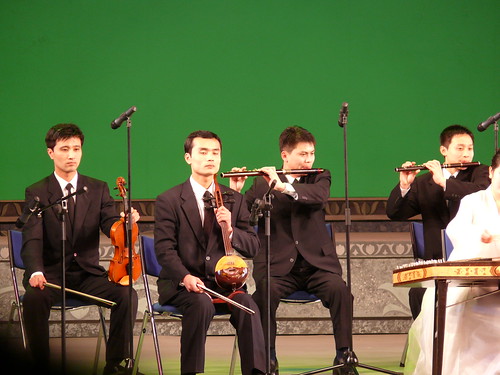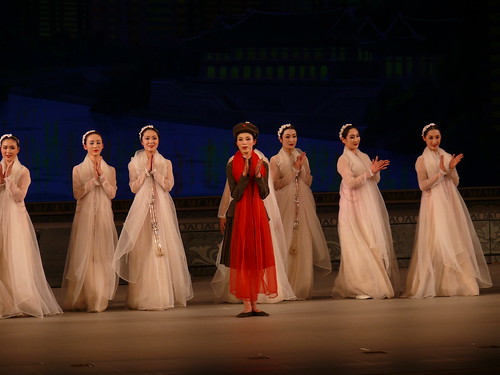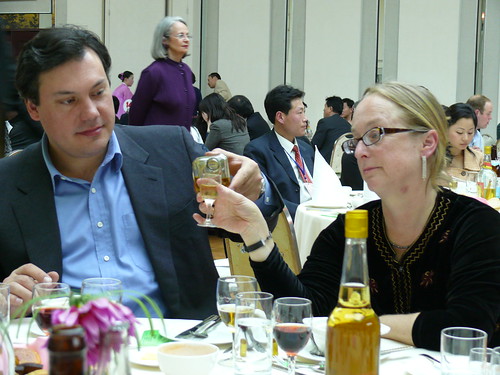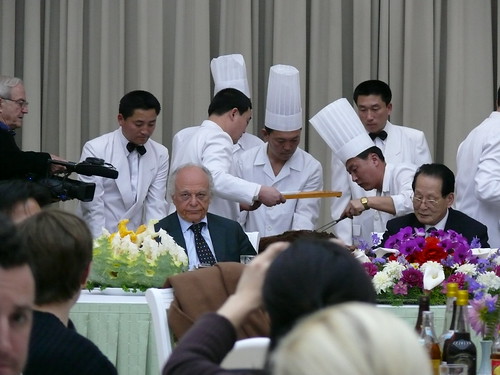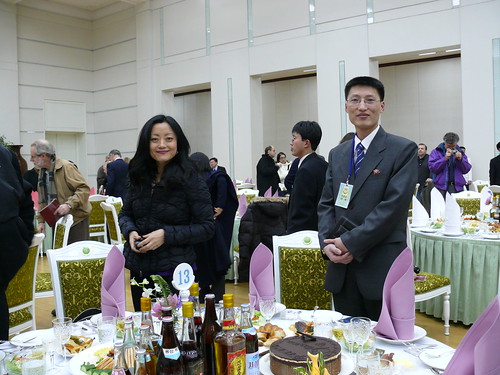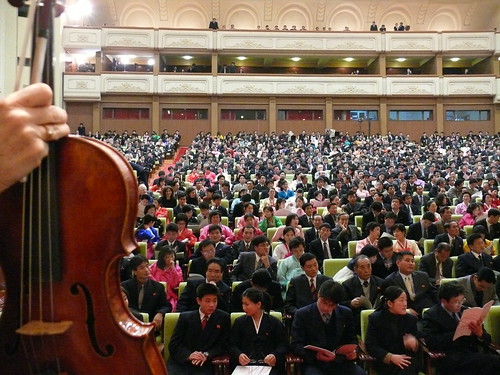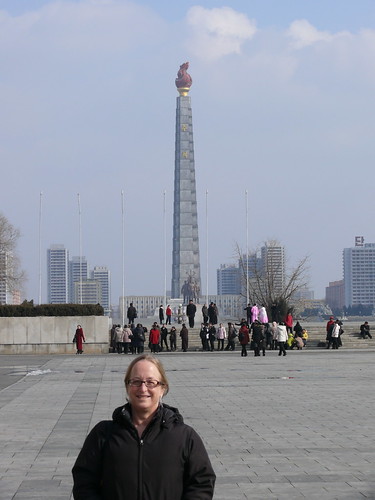A VIOLIST IN THE DPRK3
Just a few hours later was the real event: the first concert ever played by any major international orchestra in Pyongyang. Another precedent was set as well; it was the first live concert to ever be televised within North Korea. Very few people in the countryside have televisions of course, and since electricity is in short supply even many of those with radios may have missed it.



Every seat was full, and there was an American flag on one side of the stage and a North Korean flag on the other. The men were uniformly dressed in dark suits, each with a lapel pin picturing the “Great Leader”. These pins come in different shapes , and everyone has one. According to my minder, they are given the pins at age 12, and wear them for the rest of their lives. If they lose them, they incur severe punishment. The women were mostly in traditional billowing bright colored Korean dresses.

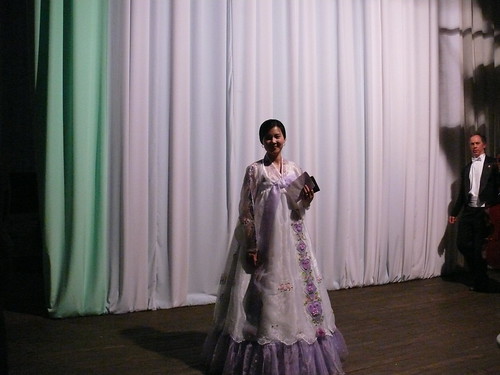
The stage was cleared 10 minutes before the concert started, and we entered as a group to prolonged applause, remained standing and commenced the North Korean National Anthem, Aegukka. The audience stood, and then remained dutifully standing during the Star Spangled Banner, surely a first! We then played the Dvorak New World Symphony, Gershwin’s American in Paris and 2 encores before reaching the piece de resistance- the traditional Korean song “Arirang”, which has come in both Koreas to symbolize re-unification.
It was then that the stiff facade crumbled. The audience had seemed appreciative but somewhat uninvolved to me until this point, though others saw some smiles in the Gershwin. But "Arirang" drew tears to their eyes, smiles to their faces, and there was an immediate and overwhelming response. We took bow after bow, and then came the high moment of the tour, and perhaps of any concert I have ever played. They simply wouldn’t let us leave. They broke into waves, and those orchestra members who had begun to leave the stage clustered at the doors, smiling, waving, and crying. This went on for more than 5 minutes.

It would have taken a heart of stone to not be moved by this moment of connection, of emotion, and of the power of music. I have to admit that until this point, I had been a skeptic about the possible value of such a concert. There has been a lot of criticism, much of it valid in my opinion, but it is hard to see how the few thousand individuals who were present could forget this connection and continue to hate us quite as much as they had been taught to, and perhaps that is enough of a start for now. It’s a softening, as someone said. It’s a seed of realization that we are not devils, just people. It’s perhaps a glimpse through the window of what life is like outside of the hermit kingdom.
Afterwards, another banquet as lavish as the first. Having succeeded in opening my window to cool down my room, guiltily wasting the precious energy needed desperately just down the street, I slept. Too soon, I was awakened by the voice of the “Dear Leader” himself. On every corner in Pyongyang is a speaker mounted on a telephone pole, and the wake-up call comes at 7 A.M. An hour of the “Dear Leader”, followed by a woman singing patriotic songs, and then military marches. No need for an alarm clock in this bizarre city! In the patriotic mood, I made a shopping stop at the hotel shop which sold an amazing bonanza of propaganda, as well as such delicacies as bear gall bladder (reputed to have medicinal properties and illegal in most of the world) and snake liquor ( a luxury item only for the very rich). Only Euros were accepted as payment. The "Juche" idea extolled in the sign below is a basic tenet of North Korean politics, and roughly translates as "self-reliance". Much of the control the current regime exerts is based on keeping North Koreans utterly isolated from the rest of the world and convinced that North Koreans are superior to other ethnicities and cultures.
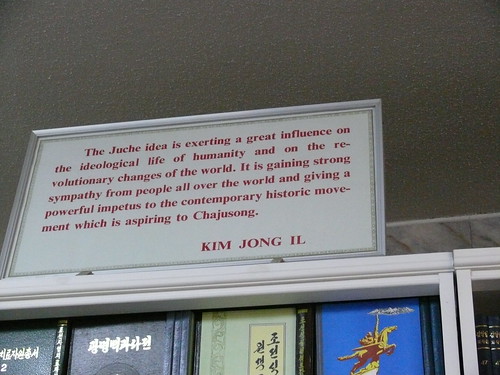


Then another mystery: While Lorin Maazel conducted a rehearsal of the North Korean State Orchestra, attended by the entire press corps and 400 North Korean musicians, we were taken elsewhere. It seemed clear by this time that the official policy was to avoid contact between the North Korean musicians and us. Whether this was out of fear of what might come of such contact, or that the musicians had not been granted clearance to talk to foreigners, we don’t know. The only exception was a few master classes given to students under strict supervision.
It was clearly not an oversight, and many of us were frustrated. It is the norm on our tours for musicians to mingle with their colleagues to share impressions and knowledge and to get to know each other, but that clearly wasn't going to happen in the DPRK!
Instead, we were taken to another performance- this time at the Children’s Palace, the home and school of 5000 talented children who are plucked at age 5 from their families, forced to train for 12 hours a day and trotted out to perform for any visiting dignitaries.
It is impossible to describe adequately in words this show. It was put on especially for us, and the remaining seats were filled with stone-faced students who, as we later learned, were under strict orders not to speak to the foreigners. The smiles of the previous night were gone.
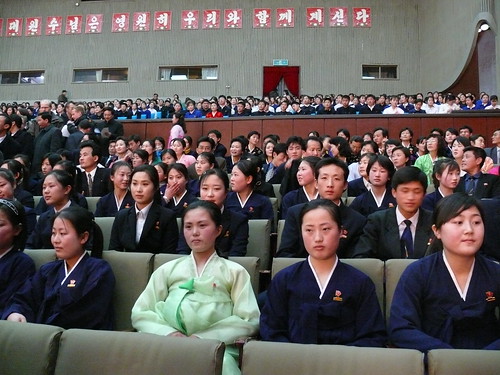
The pieces were almost all in praise of the regime: “The Generalissimo Danced With Us” and the well-known favorite, “We Are Faithful Only to Kim Jong-Il”. They made sure to provide us with English supertitles!
Many numbers were downright surreal and creepy, like a well-honed accordian ensemble straight out of the Laurence Welk Show, and a lineup of tots singing “Jingle Bells” in Korean.
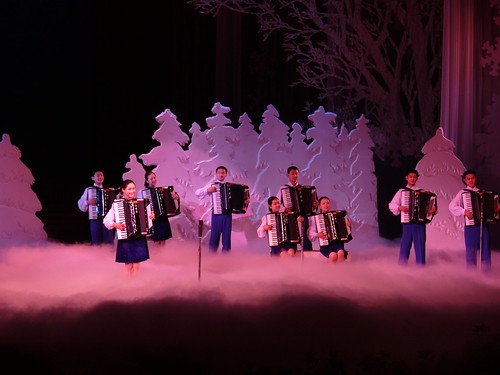


But the performances, oh the performances! The children were unbelievable. The level was so high as to invoke total awe and disbelief. But smiles were as if painted on. Not one kid made a mistake. There were no moments of laughter or spontaneity.

Yet the few that were genuinely from the heart made it all worthwhile: an 8 year old Korean wooden flutist, Kim Jon Ri, who played with incredible technique and plaintive emotion.
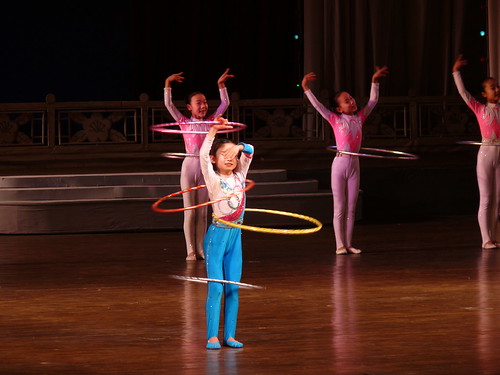
An exuberant young acrobat, Kim Yun Hyok and his troupe.


Again many came away in tears at the beauty, the childhoods lost. And yet these children are the lucky ones: they have food. They have warmth. They have art, dance and music. Perhaps someday they’ll have freedom to determine their own lives, to pursue their art or not, and to think for themselves. One can only hope.
Then, time to go. We were taken to the to the airport under police escort.

On the bus back to the airport, one of our minders gave an bizarre but obviously heartfelt and emotional speech. He told us that Kim Jong Il loves the people and loves peace. His people don’t want war. We should all return to our homeland and tell our people that Kim Jong-Il only wants the best for us.
Once at the airport, we said our farewells to our minders, but did not exchange contact information, as they are not permitted to correspond with foreigners.
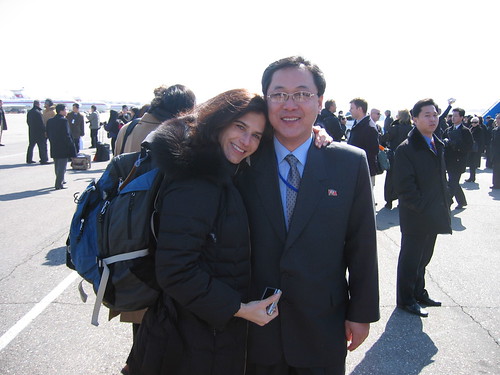
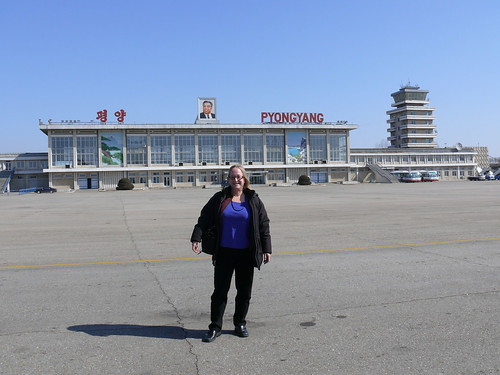
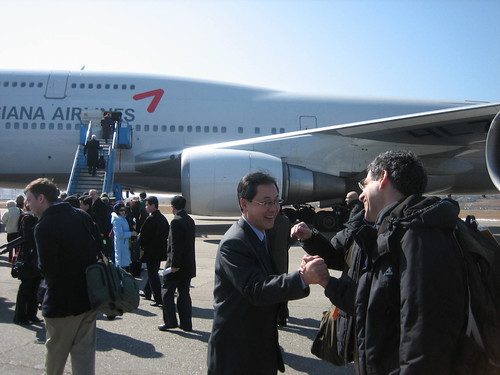
And waved farewell to the strangest place by far I have ever visited; I can only describe it as being in the midst of a religious cult with a sinister and militaristic atmosphere.
Below, a village, name unknown.
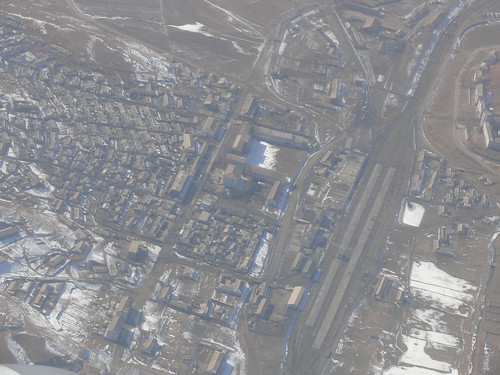
Upon our arrival in Seoul we were totally moved by the depth of emotion and excitement among South Koreans about our trip to North Korea. From the airline attendants to the hotel staff, everyone wanted to know every detail. Many, of course, left family behind in the north and our visit clearly provoked a lot of strong feelings. We even became celebrities at a local vegetarian restaurant, where the other patrons embraced us and took pictures.

The audience in the south too received us with tremendous enthusiasm and warmth. This time they expected "Arirang", and the resulting ovation was tumultuous.
Everyone, it seems, yearns for eventual re-unification, even though nobody knows what that would mean economically or politically. As one diplomat put it to our director Zarin Mehta, we are loved by 70,000,000 Koreans now.
Real change, of course, takes time. This is obvious, but even more true in what is now arguably the least-known, most repressive and isolated nation in the world. Nonetheless, I came away convinced that those who sum up our visit as merely entertainment for the elite, and who compare it to concerts given during the Third Reich, are also missing something. It is hard to believe that anyone we met could still think of Americans quite as harshly as before, and that is at least a start. No-one who witnessed the event in person or through the media, whether American or Korean, came away unchanged. As my fellow violist, Katherine Greene put it, “Thus it begins”.





